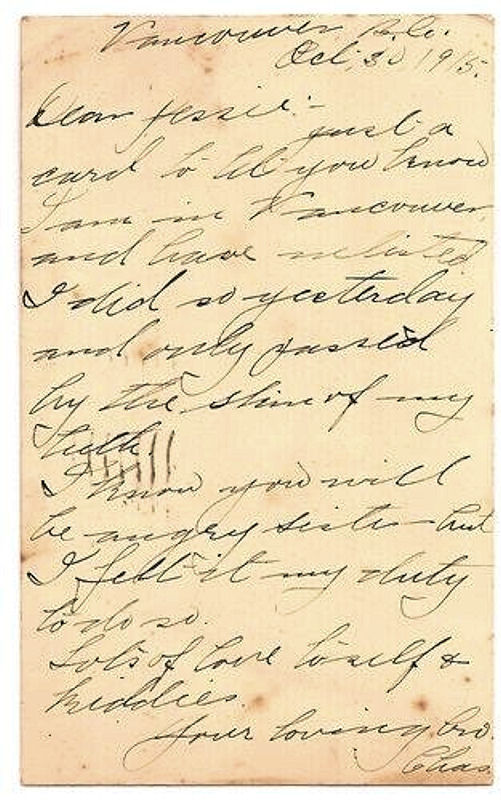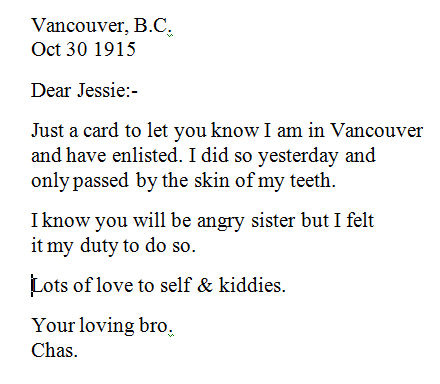Charles Francis Wooler's
Letter to His Sister
This card was sent by
Charles Francis Wooler
to his sister explaining why he joined up in
1915.
- donated
to this site by Kathy Perow – Charles’ niece


Letter Home

Dear Readers,
I
Some historians would say the Canadian victory achieved on Vimy Ridge
changed the outcome of the war and helped shape the country we live in
today.
Pte Leo Kelly, Fulham M. Hospital
London W., 6, H.1.W.
Mr. P.M.
Kelly;
Dear Father,
I am writing to you a short story on what took place in the great battle won
by the Canadians on Easter Monday on Vimy Ridge.
On the morning of April 9th between the hour of five-thirty or six o’clock
was the time selected for the Canadians to make the big drive on the Germans
at Vimy Ridge.
All day Easter
Sunday and all that night the boys worked hard preparing for the awful work
which they had before them still they never faltered but I laughed and sang
as if nothing was going to happen.
We all spent the
night in a tunnel about forty feet in the earth.
It was the only safe place around Vimy Ridge then for it was about as much a
hell hole as one would want to be in.
About three o’clock that morning we had breakfast which was a very good one.
It consisted of bacon, bread, butter, tea and oranges, a meal we do not get
very often out here.
I guess the cooks
opened their hearts for once.
They knew the boys
would have a hard day and that it would be the last meal for quite a few of
them.
Never the less our
Battalion was very fortunate in the line of casualties, which I think was
quite light.
After breakfast we got our issue of rum, which was rather small, but we
don’t need rum to fight, all we need is grub and cigarettes.
Well, Father, it was getting near the time for work.
We got the order
“ get ready” which
we were not long in doing.
We had a heavy load
to take across.
I was in the
Machine Gun Section and had to carry ammunition for the gun.
We then lined up in the trench, got into position, fixed bayonets;
everything was as quiet as a mouse.
The Huns knew we
were going over but little did they expect us on that morning.
We did not have long to wait.
Out engineers blew
two mines that ran under the Hun’s front line.
This was a signal for the artillery.
The explosion was
hardly heard when many thousands of guns both large and small opened a
terrific barrage on the Hun front line.
The boys waited no
longer, they went over the top in a moment, making their way bravely across
“No Man’s Land” to meet the Germans.
To our surprise
when we got there we found the line quite empty as the enemy could not stand
our terrific artillery fire and fled for shelter to their dugouts and were
taken prisoners.
The barrage was now
playing on the German’s second line, which was our objective, so we pushed
over the shell ploughed ground, mud and water to the waist.
Men were falling here and there but still the boys kept on.
Our gun crew got scattered.
The man who carried
the gun and I we were alone and we did not go far when he fell.
I turned him over but he did not move.
I could not wait so
I picked up the gun hoping to get it to the second line safely, for a
machine gun is a great weapon against the enemy.
It fires six or seven hundred rounds a minute.
But luck was
against me for I did not go very far when it was smashed to pieces on my
shoulder; it had been struck by sniper fire.
I was not hurt and
I did not mind the gun only I now had no weapon.
I had thrown my rifle away when I had picked up the machine gun.
All I had was a revolver but it would not work for mud.
I reached the second line safely, I seen Jack and Leo McGuire and they were
O.K; they said it was great sport.
Well father, I was looking for souvenirs when I got hit with shrapnel in the
left hand.
One of our officers
sent me out to a dressing station, so they kept me going until I finally
arrived in a London hospital.
It was a beautiful
place and the people were so kind especially the young nurses.
Well Father, if the town people of Pembroke had seen the Pembroke boys of
the 130th battalion (now the 38) go through the Hun that morning
they would not say that they were Kitchener’s last hope.
There are quite a
few Pembroke boys in the 38 Battalion.
Well father, I guess I will ring off, wishing you all had a Merry Easter and
eat some eggs for me.
Your loving son,
Leo Kelly
Many Thanks to the Reid Family of Brampton, Ontario for sharing this letter.
Back to Page Two and the Photo Gallery
page 4 - Guests' Photographs and comments
|
|
last updated: May 2012
